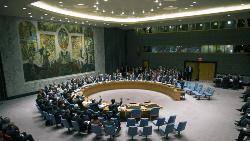Saudi Arabia angrily rejected a UN Security Council seat on Friday, accusing the UN body of "double standards" over the Syria war and other trouble spots in an unprecedented diplomatic assault.
The Saudi move sparked disarray at the Security Council where it only won the seat on Thursday at a UN General Assembly election.
Russia criticized the Saudis' "strange" decision, but the kingdom got a more understanding reaction from Western nations.
UN leader Ban Ki-moon said Saudi Arabia did not immediately send notification of its decision to reject the term, due to start on January 1.
Diplomats said it could be possible to persuade the Saudi government to reverse the decision.
"Work mechanisms and double-standards on the Security Council prevent it from carrying out its duties and assuming its responsibilities in keeping world peace," the Saudi foreign ministry said in a statement.
"Therefore, Saudi Arabia... has no other option but to turn down Security Council membership until it is reformed and given the means to accomplish its duties and assume its responsiblities in preserving the world's peace and security," it added.
Unprecedented move
The government said "allowing the ruling regime in Syria to kill and burn its people" with chemical weapons is "irrefutable evidence and proof of the inability of the Security Council to carry out its duties and responsibilities."
Saudi Arabia... has no other option but to turn down Security Council membership until it is reformed and given the means to accomplish its duties and assume its responsiblities in preserving the world's peace and security.
Statement, Saudi foreign ministry
Saudi Arabia was one of five nations elected by the UN General Assembly on Thursday to start a two-year term on the Security Council. The others were Chad, Chile, Lithuania and Nigeria. All had stood unopposed.
No country has ever won a council seat and then refused to take it up.
Saudi Arabia's UN ambassador, Abdullah Al-Mouallimi, gave several press interviews hailing the election.
But the celebrations had barely finished when the Saudi foreign ministry announced the withdrawal.
Russia boycotted council meetings in 1950 in a dispute over who represents China. The council held meetings without them.
In 1980, Cuba and Colombia failed to get a required majority in repeat General Assembly votes. The Council met with 14 members for two weeks until Mexico was finally elected.
If Saudi Arabia maintains the threat, the Asia-Pacific group of nations would have to propose a new candidate for the General Assembly to vote on.
'Strange' behavior
Several envoys said that efforts would be made to persuade Saudi Arabia to take up its seat.
The Russian foreign ministry sharply criticized Saudi Arabia's "strange" argument on the council's record on Syria.
Russia and Saudi Arabia have a traditionally testy relationship, made worse by Russia's support for Assad and Saudi's for opposition.
"The kingdom's arguments arouse bewilderment, and the criticism of the UN Security Council in the context of the Syrian conflict is particularly strange," the ministry said.
However, France said several countries share Saudi Arabia's frustration.
"We think that Saudi Arabia would have brought a very positive contribution to the Security Council, but we do also understand the frustration of Saudi Arabia," France's UN ambassador Gerard Araud told reporters.
PHOTO CAPTION
A file photo, the United Nations Security Council votes on a resolution that will require Syria to give up its chemical weapon, at U.N. Headquarters.
Al-Jazeera


 Home
Home Discover Islam
Discover Islam Quran Recitations
Quran Recitations Lectures
Lectures
 Fatwa
Fatwa Articles
Articles Fiqh
Fiqh E-Books
E-Books Boys & Girls
Boys & Girls  Articles
Articles










